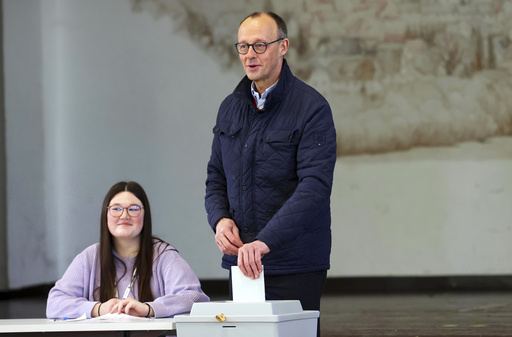
**Berlin** – Voters in Germany are casting their ballots in a crucial election this Sunday, as the nation grapples with several pressing issues affecting Europe’s largest economy. The election atmosphere is charged with apprehensions about years of economic stagnation, calls to manage migration effectively, and the unpredictability surrounding Ukraine’s future, as well as the broader European alliance with the United States. Recent polls suggest that the center-right opposition is likely to emerge victorious, with a far-right party poised to achieve its strongest electoral performance since World War II.
As the most populous country in the European Union and a significant NATO member, Germany plays a key role in regional affairs. It has been the second-largest supplier of arms to Ukraine, following the U.S., and will be crucial in shaping Europe’s strategies for future challenges, especially in light of the confrontational foreign and trade policies of the Trump administration.
The top candidates in the election include conservative frontrunner Friedrich Merz and the current Chancellor Olaf Scholz, representing the Social Democrats. Both cast their votes in different regions of the country just minutes apart on Sunday morning.
**What are Germans voting for?**
Of the 84 million Germans, over 59 million are eligible to elect 630 representatives to the lower house of parliament, known as the Bundestag, which convenes in the iconic Reichstag building topped by its glass dome. Germany’s electoral system traditionally fails to yield absolute majorities, and none of the parties appear close to achieving one this time around. It is anticipated that multiple parties will need to form a coalition, potentially facing extensive negotiations that could stretch on for weeks or even months before a new chancellor is elected.
This election comes approximately seven months earlier than initially scheduled, necessitated by the fall of center-left Chancellor Olaf Scholz’s coalition in November. This resulted after three years marred by infighting. There is notable public dissatisfaction and a lack of enthusiasm for the candidates on offer.
**Who could take charge?**
The center-right Union bloc, headed by Friedrich Merz, has consistently topped polls, anticipated to secure between 28% to 32% of the vote, making Merz the favored candidate to take over as Chancellor. In stark contrast, Scholz’s Social Democrats have been polling only 14% to 16%, a dismal showing that would mark their worst post-war electoral outcome.
The far-right, anti-immigration party known as the Alternative for Germany (AfD) is currently polling second, with around 20% of the electorate supporting its candidate for chancellor, Alice Weidel. This represents a significant increase from their previous best of 12.6% in the 2017 elections. However, many of the conventional parties have pledged not to collaborate with them in any future government arrangements, a stance often referred to as the “firewall.”
The Green Party, led by outgoing Vice Chancellor Robert Habeck, is also in the mix but trails behind Scholz’s Social Democrats in recent polling.
Merz has promised “stability instead of chaos,” citing the internal strife that led to the collapse of Scholz’s three-party coalition and calling for revitalization of the economy. Nonetheless, it remains uncertain whether he can assemble a stable government capable of implementing significant changes. While he hopes for a two-party coalition, he may find it necessary to enlist a third party to establish a functioning government.
Potential partners in a Merz-led government could include Scholz’s Social Democrats, the Greens, and the Free Democrats, who were the smallest faction in the previous government and may struggle to remain represented in parliament. The Free Democrats, along with another smaller party, hover around the 5% threshold necessary for securing seats in parliament, which raises the likelihood of a fractured coalition.
**What are the main issues?**
The candidates have proposed various strategies aimed at reversing the downturn in Germany’s economy, which has contracted for the last two years without achieving sustainable growth for an even longer period. Addressing these economic challenges will be a central task for the next government.
In recent weeks, migration has surfaced as a pressing topic in the election, particularly in light of violent incidents linked to immigrants. Merz has pledged to impose stricter measures on entries into the country lacking proper documentation and to enhance deportation efforts if he wins the chancellorship. He introduced a motion advocating for increased refusals of migrants seeking to enter Germany, securing narrow approval from parliament, aided by backing from the AfD—marking a first in post-war German history.
This stance has prompted criticism from his rivals, who have publicly condemned Merz’s association with the AfD. Scholz accused him of “irresponsible gambling” and violating a long-standing political taboo. In response, Merz has firmly denied any intention to collaborate with the AfD, stating emphatically that his party will “never” ally with them.
Mainstream political factions have reaffirmed their commitment to supporting Ukraine amid its conflict with Russia. Furthermore, following the achievement of a NATO target that mandates member states spend 2% of their GDP on defense, the incoming administration will need to devise strategies to maintain or exceed this investment, particularly in light of anticipated U.S. expectations, once a substantial fund earmarked for military modernization is exhausted by 2027.

